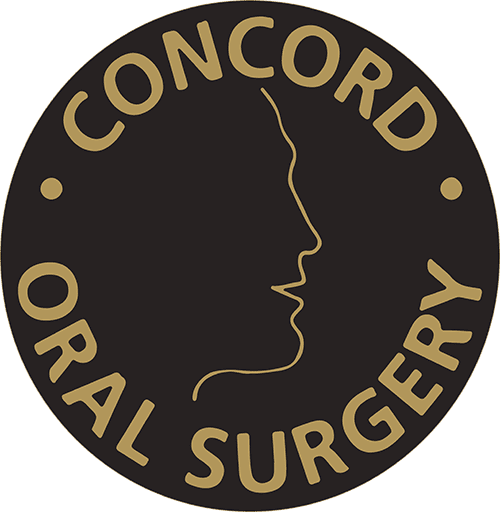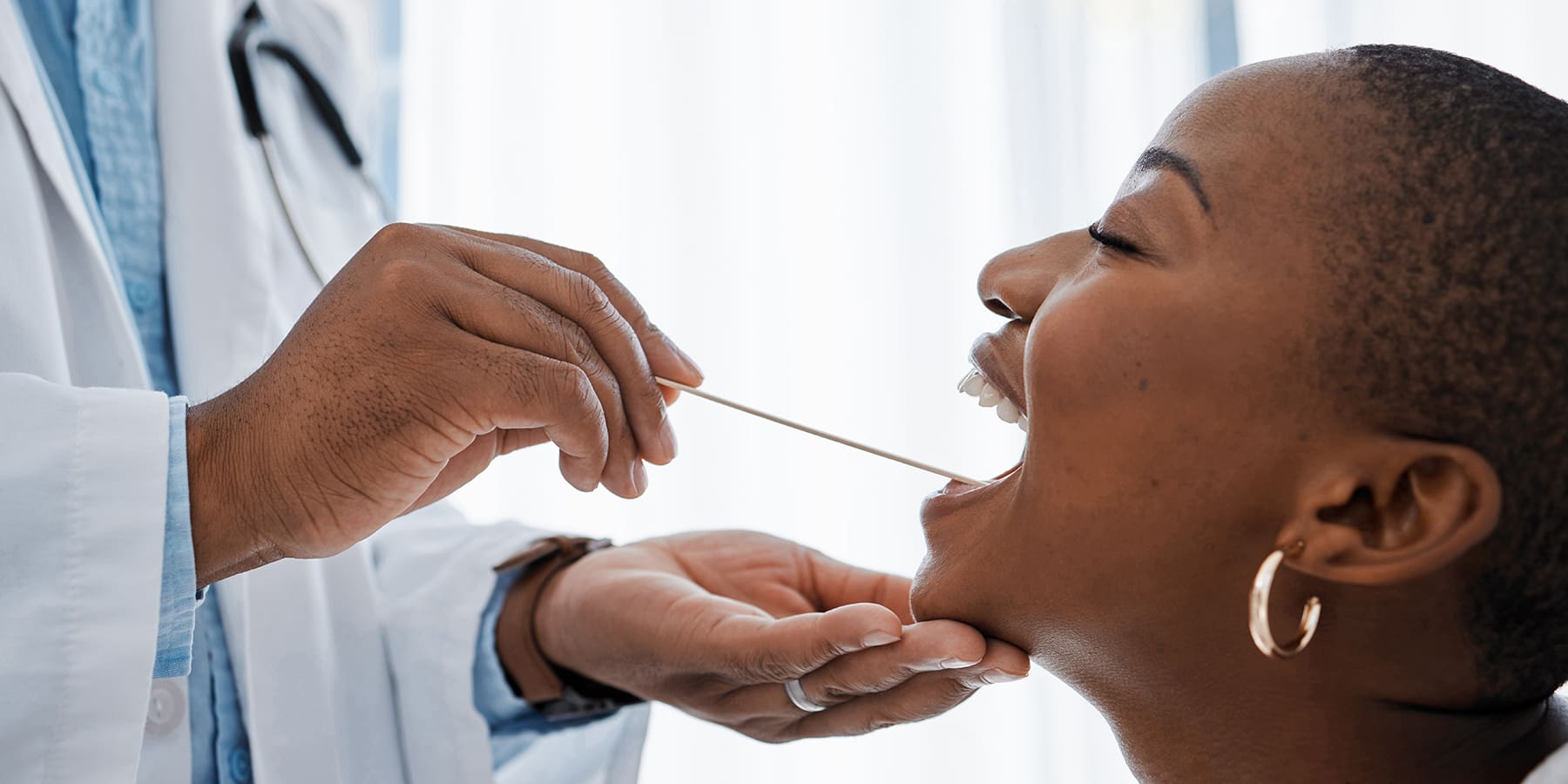Reviewed By Dr. Robert Barron, DMD
Reading Time: 5 minutes
April is Oral Cancer Awareness Month, a time to talk openly about a silent threat that can go unnoticed until it becomes serious.
At Concord Oral Surgery, we believe in early detection, straightforward care, and empowering you with the knowledge to take action.
In this blog, you will learn:
- Signs to watch for in your oral cavity
- Details of an oral cancer screening and pathology exam
- How to perform monthly oral self-exams
Table of Contents
Key Takeaway
If you notice a sore that does not heal, a red or white patch, a lump, chronic hoarseness, numbness or difficulty swallowing, these could be signs of oral cancer. Conduct monthly self-exams and see your dentist if anything looks off.
Understanding Oral Cancer
Oral cancers include cancers of the lips, tongue, cheeks, gums, floor of the mouth, roof of the mouth, and throat. Some are oropharyngeal cancers that affect the back of the throat and tonsils.
They can develop quietly, often without pain in the early stages. That is why early detection is so important.
The Canadian Cancer Society estimates over 8000 Canadians are diagnosed with oral cancer every year. Many of those cases are not caught until the disease has already progressed.
Risk factors include human papillomavirus (HPV), tobacco products, heavy alcohol consumption, and poor diet.
Recognizing Warning Signs
You know your mouth best. If something feels or looks off, it is worth getting checked.
Common signs and symptoms include:
- Sores that do not heal, especially if they last more than two weeks
- Red or white patches on your tongue, gums, or inside your cheeks
- Lumps or thickened tissue anywhere inside your oral cavity or throat
- Chronic sore throat or hoarseness, especially if your voice sounds raspy or weak for more than two weeks
- Pain or difficulty chewing or swallowing
- Numbness in the mouth or lips
- Loose teeth not related to gum disease
- Unexplained weight loss or bad breath
If you notice any of these symptoms, contact us to schedule an oral pathology exam. Oral cancer increases in severity the longer it remains untreated.
How to Conduct a Self-Exam
A monthly oral self-exam helps you notice changes early. Stand in front of a mirror with good lighting and use clean hands.
Follow these steps:
- Check your lips and gums: Look for sores, swelling, or discoloration.
- Pull back your cheeks: Examine the inner lining for red or white patches or abnormal tissue.
- Look under your tongue: Use a finger or gauze to lift it. Check for lumps or color changes.
- Tilt your head back: Examine the roof of your mouth.
- Stick out your tongue: Look at the top, bottom, and sides. Move it around to check mobility.
- Feel your neck and jaw: Use your fingers to check for lumps or tenderness in nearby tissues.
If you spot anything unusual or persistent, schedule an appointment with your dentist or an oral surgeon.
The Oral Pathology Exam Process
When performed at Concord Oral Surgery, the exam generally follows these steps.
Here is what to expect:
- A full soft tissue exam: We examine the tongue, lips, cheeks, palate, floor of the mouth, and gums. Our team diligently checks for signs of abnormal cell growth.
- Biopsy scheduling (often same-day): If a suspicious lesion is found, a biopsy may be performed during the consultation. If not possible, a follow-up appointment will be booked.
- Sample sent to a pathologist: The tissue sample is sent to a specialized oral pathologist for diagnosis.
- Wait time for results: Results typically return within 2 to 3 weeks.
- Follow-up plan:
- Benign lesions: Often require no further treatment.
- Dysplastic or precancerous lesions: Require monitoring every 4–6 months and potentially additional biopsies.
- Definitive treatment: May follow if malignancy or progressive disease is identified.
We accept referrals from both MDs and dentists, but you can also contact us directly. You do not need a referral to book an appointment.
Conditions That May Resemble Oral Cancer
Not every lesion is cancer, but if you are concerned it’s always better to err on the side of caution.
Common oral conditions that resemble cancer include:
- Canker sores: Painful but usually short-lived
- Traumatic ulcers: Caused by accidental bites or friction from dentures or form of tobacco use
- Lichen planus: An autoimmune condition that causes white patches
- Fungal infections (like thrush): Often appear as white, wipeable patches
- Leukoplakia or erythroplakia: Precancerous changes that must be monitored closely
- Oral warts or papillomas: Can look like small, raised growths
If a lesion does not resolve or returns repeatedly, it is best to have it evaluated.
The Concord Oral Surgery Advantage
Here is what makes us stand out as trusted healthcare providers focused on oral cancer prevention and successful treatment outcomes:
- We often perform same-day biopsies for faster peace of mind
- Our team include an experienced surgeon who cares deeply about successful treatment outcomes
- You will receive compassionate follow-up and clear communication
- Our clinic uses advanced imaging and diagnostic tools for accurate care
Schedule An Exam Today
If you see or feel something unusual in your mouth, do not wait. April is the perfect time to prioritize your oral cancer risk with routine exams.
To book an exam at our oral surgery office in Vaughan, call (905) 669-2616 or complete the appointment request form. We are located at 3300 Highway 7 West, Suite 805 Vaughan, ON.
FAQs About Oral Lesions
How long should I wait before scheduling an exam?
If a lesion or mouth sore lasts more than two weeks, it should be checked promptly.
Can benign conditions still require monitoring?
Yes. Some conditions like leukoplakia or dysplasia need to be monitored regularly to avoid future health problems.
Is a referral necessary to have a biopsy performed?
No. You do not need a referral to schedule an exam at our clinic. However, if you have dental insurance, they may require a referral from your primary physician or dentist.
Does the biopsy procedure cause significant pain?
Most oral cancer patients tolerate the procedure well. We offer sedation options to ensure your comfort.
How often should I perform a self-check of my mouth?
Perform a self-check once a month and be alert to any changes. Combine this habit with daily flossing, regular checkups, and a well-balanced diet for best oral health results.

